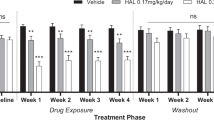Abstract
Rationale: Dopamine is important for enabling organisms to overcome work-related response costs. One way of investigating this function has been with concurrent choice procedures using food reinforcement. In the present study, rats were given a choice between pressing a lever for preferred Bioserve pellets, or approaching and consuming a less-preferred laboratory chow that was concurrently available. In previous work with this task, dopamine antagonists and accumbens dopamine depletions decreased lever pressing but increased chow consumption. Objective: The present study assessed three drugs (two dopamine antagonists and one appetite suppressant) using the lever pressing/chow feeding task. Results: Under baseline conditions, rats pressed the lever at high rates (1,300–1,500 responses) to obtain the preferred food, and little of the laboratory chow was eaten (1–2 g). Selective D1 and D2 antagonists (SKF 83566 and raclopride) reduced fixed ratio 5 lever pressing, but substantially increased chow consumption. In contrast, the serotonergic appetite suppressant fenfluramine reduced both lever pressing and chow consumption. With the dopamine antagonists, lever pressing and chow consumption were inversely correlated across treatments, while these two measures were unrelated in the fenfluramine experiment. Conclusions: Dopamine antagonists and accumbens dopamine depletions do not simply reduce appetite. Rats with accumbens dopamine depletions, or rats treated with low doses of selective or non-selective dopamine antagonists, remain directed toward the acquisition and consumption of food. These results demonstrate that fundamental aspects of food reinforcement are left intact after treatment with low doses of dopamine antagonists.
Similar content being viewed by others
Author information
Authors and Affiliations
Additional information
Electronic Publication
Rights and permissions
About this article
Cite this article
Salamone, J., Arizzi, M., Sandoval, M. et al. Dopamine antagonists alter response allocation but do not suppress appetite for food in rats: contrast between the effects of SKF 83566, raclopride, and fenfluramine on a concurrent choice task. Psychopharmacology 160, 371–380 (2002). https://doi.org/10.1007/s00213-001-0994-x
Received:
Accepted:
Published:
Issue Date:
DOI: https://doi.org/10.1007/s00213-001-0994-x




